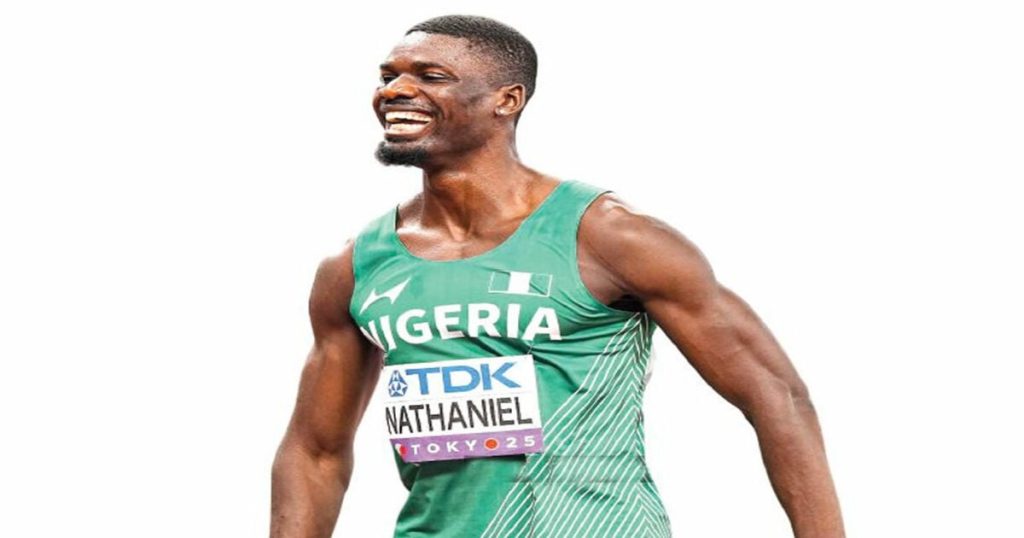The 2025 World Athletics Championships in Tokyo served as a stage for both triumph and near-misses for the Nigerian team. Ezekiel Nathaniel provided the most dramatic moment, shattering his own national record in the men’s 400m hurdles with a time of 47.11 seconds. This impressive feat, achieved against a field of world-class athletes, placed him fourth, agonizingly close to a podium finish. Adding to the drama, a disqualification of the initial winner briefly elevated Nathaniel to the bronze medal position, kindling hopes of Nigeria’s first men’s World Championship medal in over two decades. However, a subsequent appeal and review reinstated the original winner, leaving Nathaniel just shy of a historic achievement. Nonetheless, his performance, marking his sixth national record of the year, solidified his position as a rising star and signaled his potential to contend for medals on the global stage.
Tobi Amusan, Nigeria’s most consistent performer on the world stage, delivered the lone medal for the team, securing silver in the women’s 100m hurdles. Her performance reaffirmed her status as a dominant force in the event and a reliable source of pride for Nigerian athletics. Amusan’s silver lining, however, highlighted the challenges faced by the rest of the team, who struggled to convert potential into podium finishes. While flashes of brilliance emerged, particularly from Nathaniel and Kanyinsola Ajayi’s surprise appearance in the men’s 100m final, the overall picture revealed a need for greater consistency and depth across various disciplines.
The field events proved a particularly challenging arena for the Nigerian athletes. Chukwuebuka Enekwechi’s fifth-place finish in the men’s long jump offered a glimmer of hope, but it was overshadowed by the early exits of other contenders. Chioma Onyekwere-Lyons and Obiageri Amaechi failed to progress beyond the first round of the women’s discus, mirroring the struggles of Sade Olatoye in the women’s hammer throw. Similarly, the women’s long jump saw both Prestina Ochonogor and Ese Brume eliminated in the initial stages, while Charles Godfred faced a similar fate in the men’s long jump. These results exposed a gap in competitiveness within the Nigerian field contingent compared to the global elite.
On the track, aside from Amusan’s silver and Nathaniel’s record-breaking run, performances were a mix of promise and disappointment. Kanyinsola Ajayi’s unexpected qualification for the men’s 100m final and subsequent sixth-place finish marked a significant achievement, underscoring Nigeria’s continued strength in sprinting. However, other sprinters fell short of expectations. Rosemary Chukwuma exited the women’s 100m in the heats, while Isreal Okon, despite winning his opening heat, failed to progress beyond the semi-finals. The men’s 400m saw both Chidi Okezie and Samuel Ogazi eliminated in the heats, highlighting the fierce competition in the event.
Udodi Onwuzurike offered a glimpse of future potential in the men’s 200m, advancing from the heats to the semi-finals before finishing seventh in a race eventually won by the dominant Noah Lyles. Onwuzurike’s performance, while ultimately falling short of a final appearance, suggested his potential for future growth and success. This, coupled with Ajayi’s final appearance, hinted at the potential within the Nigerian sprint program.
Overall, Nigeria’s performance at the 2025 World Athletics Championships presented a contrasting picture of progress and persistent challenges. Amusan’s silver medal and Nathaniel’s national record served as beacons of achievement, demonstrating the potential of Nigerian athletes to compete at the highest level. Ajayi’s surprise entry into the men’s 100m final further reinforced Nigeria’s sprinting prowess. However, the numerous early exits in both track and field events underscored the significant work needed to elevate the nation’s overall competitive standing. The championships served as a valuable learning experience, highlighting the areas needing improvement while simultaneously celebrating the individual successes that offer hope for future triumphs.
The Tokyo championships offered a crucial assessment of Nigeria’s position within the global athletics landscape. While individual brilliance shone through, the team’s overall performance revealed a need for sustained development and investment across various disciplines. The experience served as a valuable barometer, identifying areas where progress has been made and areas requiring greater focus to bridge the gap between potential and consistent podium finishes. The challenge now lies in building on the successes of athletes like Amusan and Nathaniel, fostering a wider pool of competitive athletes capable of challenging for medals on the world stage. The road ahead demands strategic planning, dedicated training, and a commitment to nurturing talent to ensure Nigeria’s continued presence and future success in global athletics.


